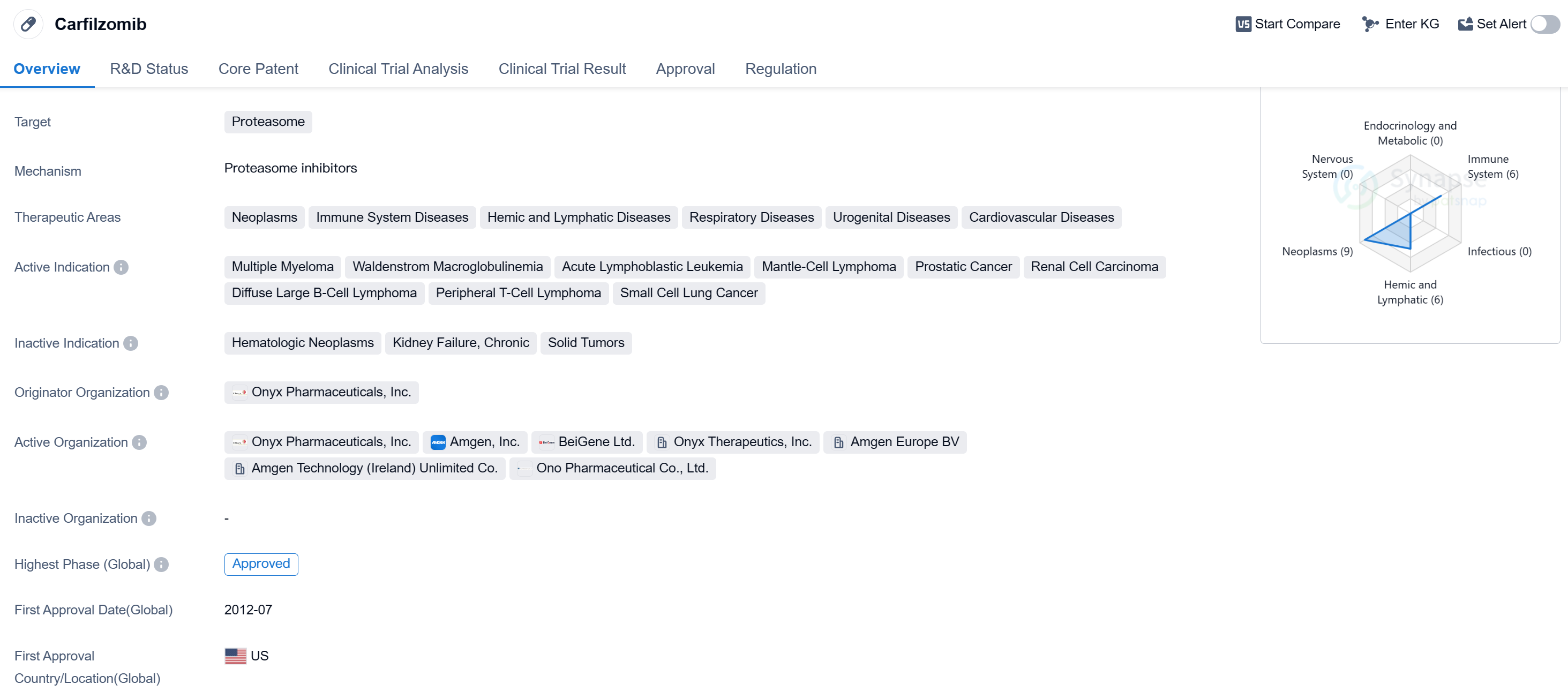Decoding Carfilzomib: A Comprehensive Study of its R&D Trends and Mechanism on Drug Target
Carfilzomib's R&D Progress
Carfilzomib is a synthetic peptide drug that targets the proteasome, which is a cellular complex responsible for degrading proteins. It has been approved for use in multiple therapeutic areas, including neoplasms (abnormal growth of cells), immune system diseases, hemic and lymphatic diseases, respiratory diseases, urogenital diseases, and cardiovascular diseases.
The drug is indicated for the treatment of several types of cancer, including multiple myeloma, Waldenstrom macroglobulinemia, acute lymphoblastic leukemia, mantle-cell lymphoma, prostatic cancer, renal cell carcinoma, diffuse large B-cell lymphoma, peripheral T-cell lymphoma, and small cell lung cancer. This wide range of indications suggests that carfilzomib may have broad potential in the field of oncology.
Carfilzomib was developed by Onyx Pharmaceuticals, Inc., and it has received approval in both the global market. The drug was first approved in the United States in July 2012, making it available to patients in need of treatment for the specified indications.
In terms of regulation, carfilzomib has received accelerated approval, fast track designation, orphan drug status, and special review project designation. These regulatory designations indicate that the drug has shown promising results in clinical trials and may address unmet medical needs for certain patient populations.
👇Please click on the image below to directly access the latest data (R&D Status | Core Patent | Clinical Trial | Approval status in Global countries) of this drug.
Mechanism of Action for Carfilzomib: Proteasome inhibitors
Proteasome inhibitors are a type of medication that target and inhibit the activity of proteasomes, which are large protein complexes found in cells. Proteasomes play a crucial role in the degradation of proteins that are damaged or no longer needed by the cell. By inhibiting proteasome activity, proteasome inhibitors can disrupt the normal protein degradation process.
From a biomedical perspective, proteasome inhibitors have been primarily studied and used in the field of cancer treatment. Cancer cells often have a higher protein turnover rate compared to normal cells, making them more reliant on the proteasome system for protein degradation. By inhibiting proteasome activity, these inhibitors can lead to the accumulation of proteins within cancer cells, causing cellular stress and ultimately triggering cell death.
Proteasome inhibitors have shown promising results in the treatment of certain types of cancer, such as multiple myeloma and mantle cell lymphoma. They can be used as a standalone therapy or in combination with other anticancer drugs. Additionally, proteasome inhibitors have also been investigated for their potential therapeutic effects in other diseases, including autoimmune disorders and neurodegenerative conditions like Parkinson's and Alzheimer's disease.
It is important to note that proteasome inhibitors can have side effects, as they can also affect the normal protein degradation processes in healthy cells. Common side effects include gastrointestinal issues, fatigue, and low blood cell counts. Close monitoring and management of these side effects are necessary during treatment.
Overall, proteasome inhibitors are a class of drugs that hold promise in the field of biomedicine, particularly in the treatment of cancer and other diseases characterized by abnormal protein degradation.
Drug Target R&D Trends for Carfilzomib
According to Patsnap Synapse, as of 10 Sep 2023, there are a total of 55 Proteasome drugs worldwide, from 69 organizations, covering 66 indications, and conducting 1635 clinical trials. The analysis of the target Proteasome reveals a competitive landscape with multiple companies actively developing drugs in different stages of development. Takeda Pharmaceutical Co., Ltd. and Amgen, Inc. are the leading companies with a strong presence in the target Proteasome. Multiple drugs have been approved for indications such as Multiple Myeloma, Waldenstrom Macroglobulinemia, and Mantle-Cell Lymphoma. Small molecule drugs and synthetic peptides are the most rapidly progressing drug types, indicating intense competition. The United States, China, and Japan are the leading countries in the development of drugs targeting the Proteasome, with China showing significant progress. Overall, the target Proteasome presents a promising opportunity for the pharmaceutical industry with a diverse range of indications and drug types.
👇Please click on the picture link below for free registration or log in directly if you have a freemium account, you can browse the latest research progress on drugs, indications, organizations, clinical trials, clinical results, and drug patents related to this target
Conclusion
Overall, Carfilzomib is a synthetic peptide drug that targets the proteasome and has been approved for the treatment of various types of cancer. Its approval in multiple therapeutic areas and its regulatory designations suggest that it may be a valuable addition to the treatment options available for patients with these diseases.






